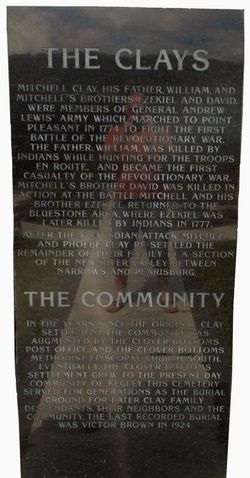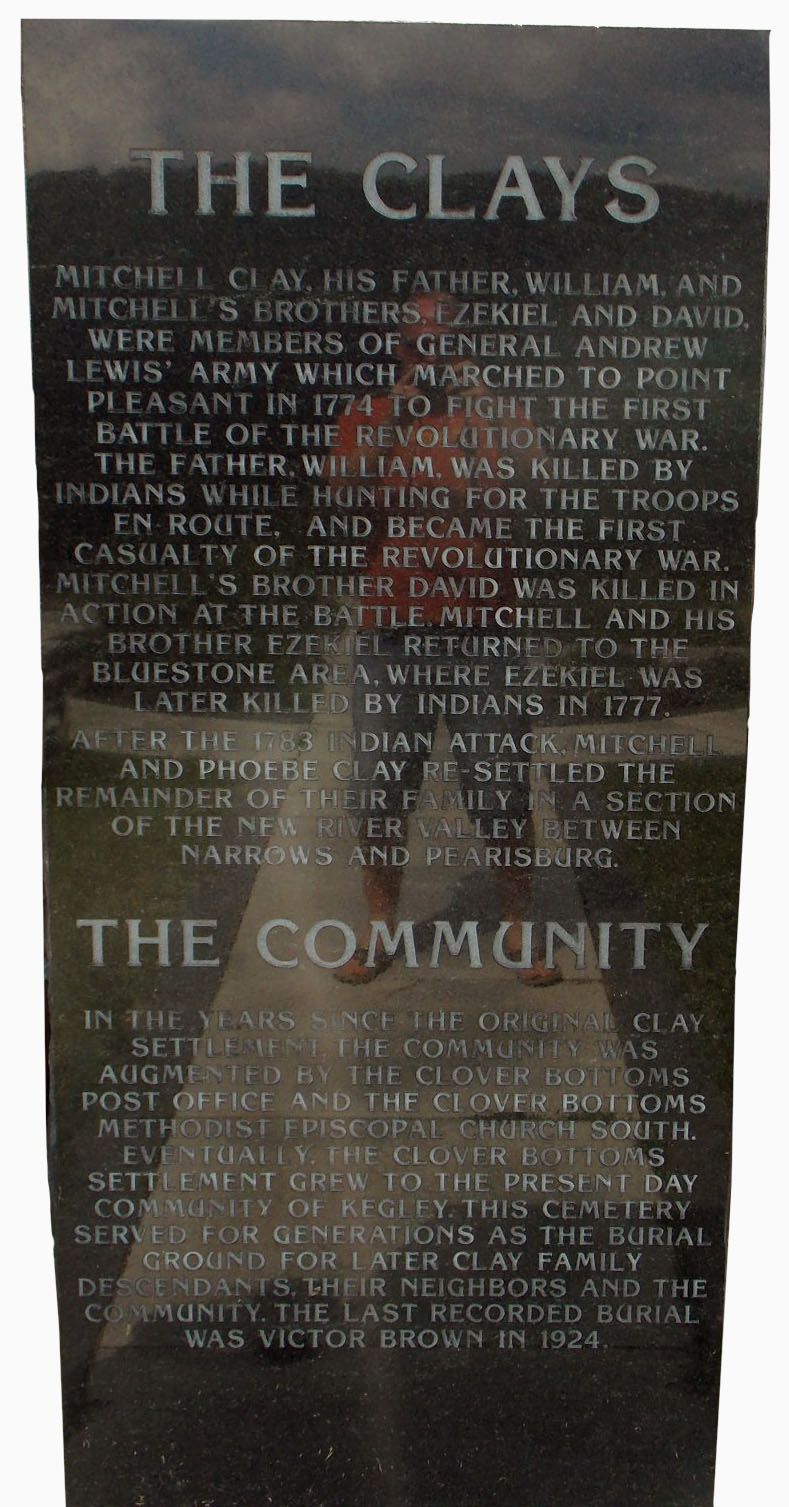William was killed by an Indian while he and another soldier (named Coward) were hunting deer to feed their militia comrades. One Indian was shot by the second militiaman, and the other escaped; the Indians had not seen him. Clay and Coward were in Col. John Field's Company of Independent Rangers, part of Gen. Charles Lewis's Regiment. These men were among the elite Virginia militia assembled by Lord Dunmore against the numerous attacks by Indians against Virginia settlers.
William was the first casualty of his unit, and they would shortly engage in the Battle of Point Pleasant (Oct 10, 1774). This battle is considered the only major battle, as well as the final one, of Lord Dunmore's War. This war was waged between the colony of Virginia and several united Native American nations, but many West Virginians have considered it the first battle of the Revolutionary War. Virginia won, and the Indians lost the rights formerly granted by treaty for hunting in the lands bordering the Ohio River, yielding these rights in a new treaty. The frontier in Kentucky and what eventually became West Virginia then opened up for more settlement by the colonists. As friction between the Colonies and Britain grew, the British allied with the defeated Indians against the settlers on the western frontier. Under these considerations, and in the ongoing debate about the status of the battle with these two wars, William's death marks a turning point toward the Revolution. The general interpretation currently is that Dunmore's War was the final conflict of the Colonies. By any definition of the Dunmore War, the shooting of William Mitchell Clay has historic significance.
William's death occurred at what is now Point Pleasant, West Virginia, on the Ohio River, where a battle monument marks the day of fighting in October. William's name is not included on the list of participants, but the name of Mr. Coward (no first name listed) is there. William's son Mitchell also fought at this battle and is on the roster.
An account of William's service are included in A. S. Withers's book, "Chronicles of Border Warfare."
Note: William's birth year is sometimes listed as 1710. Also, due to changes in county boundaries and town names, the location of birth may be given a different name even though they refer to the same location.
Son Mitchell Clay: Find A Grave Memorial# 10162828
William was killed by an Indian while he and another soldier (named Coward) were hunting deer to feed their militia comrades. One Indian was shot by the second militiaman, and the other escaped; the Indians had not seen him. Clay and Coward were in Col. John Field's Company of Independent Rangers, part of Gen. Charles Lewis's Regiment. These men were among the elite Virginia militia assembled by Lord Dunmore against the numerous attacks by Indians against Virginia settlers.
William was the first casualty of his unit, and they would shortly engage in the Battle of Point Pleasant (Oct 10, 1774). This battle is considered the only major battle, as well as the final one, of Lord Dunmore's War. This war was waged between the colony of Virginia and several united Native American nations, but many West Virginians have considered it the first battle of the Revolutionary War. Virginia won, and the Indians lost the rights formerly granted by treaty for hunting in the lands bordering the Ohio River, yielding these rights in a new treaty. The frontier in Kentucky and what eventually became West Virginia then opened up for more settlement by the colonists. As friction between the Colonies and Britain grew, the British allied with the defeated Indians against the settlers on the western frontier. Under these considerations, and in the ongoing debate about the status of the battle with these two wars, William's death marks a turning point toward the Revolution. The general interpretation currently is that Dunmore's War was the final conflict of the Colonies. By any definition of the Dunmore War, the shooting of William Mitchell Clay has historic significance.
William's death occurred at what is now Point Pleasant, West Virginia, on the Ohio River, where a battle monument marks the day of fighting in October. William's name is not included on the list of participants, but the name of Mr. Coward (no first name listed) is there. William's son Mitchell also fought at this battle and is on the roster.
An account of William's service are included in A. S. Withers's book, "Chronicles of Border Warfare."
Note: William's birth year is sometimes listed as 1710. Also, due to changes in county boundaries and town names, the location of birth may be given a different name even though they refer to the same location.
Son Mitchell Clay: Find A Grave Memorial# 10162828





